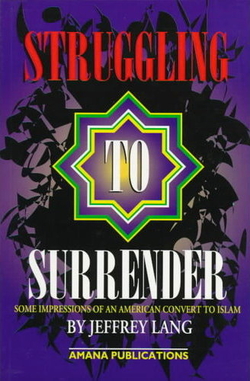 Lang, a white professor of mathematics at the University of Kansas, explains his reasons for converting to Islam at the age of twenty-eight in 1982, his subsequent experiences, and his views on reforming Islam. It may sound routine, but his is probably the only such account yet published.
Lang, a white professor of mathematics at the University of Kansas, explains his reasons for converting to Islam at the age of twenty-eight in 1982, his subsequent experiences, and his views on reforming Islam. It may sound routine, but his is probably the only such account yet published.
Like many other American converts, Lang felt disaffected from American life and refers in an off-hand way to "our society's unrelenting greed and neglect." He found himself inching toward Islam through warm personal relations, then finally making the leap. It began easily: he tells of the "jubilation and relief" his conversion brought to his Muslim friends, followed by their hugs. But things quickly became more challenging; he characterizes the transition as "a journey from individualism to traditionalism, from learning to illumination, from the sensible to the unseen, from reason to intuition."
Lang made a serious study of Islam and reflects in an informed way on such issues as the validity of the hadith (reports on the sayings and doings of the Prophet Muhammad) and the position of women. He argues that Islam's special quality lies in its rationality; and that it can only aspire to being more than "just another religion" if Muslims make a "rationally compelling case."
 More original, however, are his musings on converts like himself. On the one hand, he acknowledges that "converts can be the most severe and rigid in their ideas and practices," and that they are "often among the least tolerant" of Muslims. At the same time, not being grounded in traditions, they are "likely to bring with them radical, alien ideas" that he believes can go far to rejuvenate Islam and render it extremely appealing to a Western audience.
More original, however, are his musings on converts like himself. On the one hand, he acknowledges that "converts can be the most severe and rigid in their ideas and practices," and that they are "often among the least tolerant" of Muslims. At the same time, not being grounded in traditions, they are "likely to bring with them radical, alien ideas" that he believes can go far to rejuvenate Islam and render it extremely appealing to a Western audience.
Sep. 22, 2012 update: News fifteen years later, from a feature piece at Islam My Choice: Lang regularly performs the prayers five times a day; he married a Saudi Muslim woman, Raika, in 1998; and he serves as faculty advisor for the Muslim Student Association at the University of Kansas.